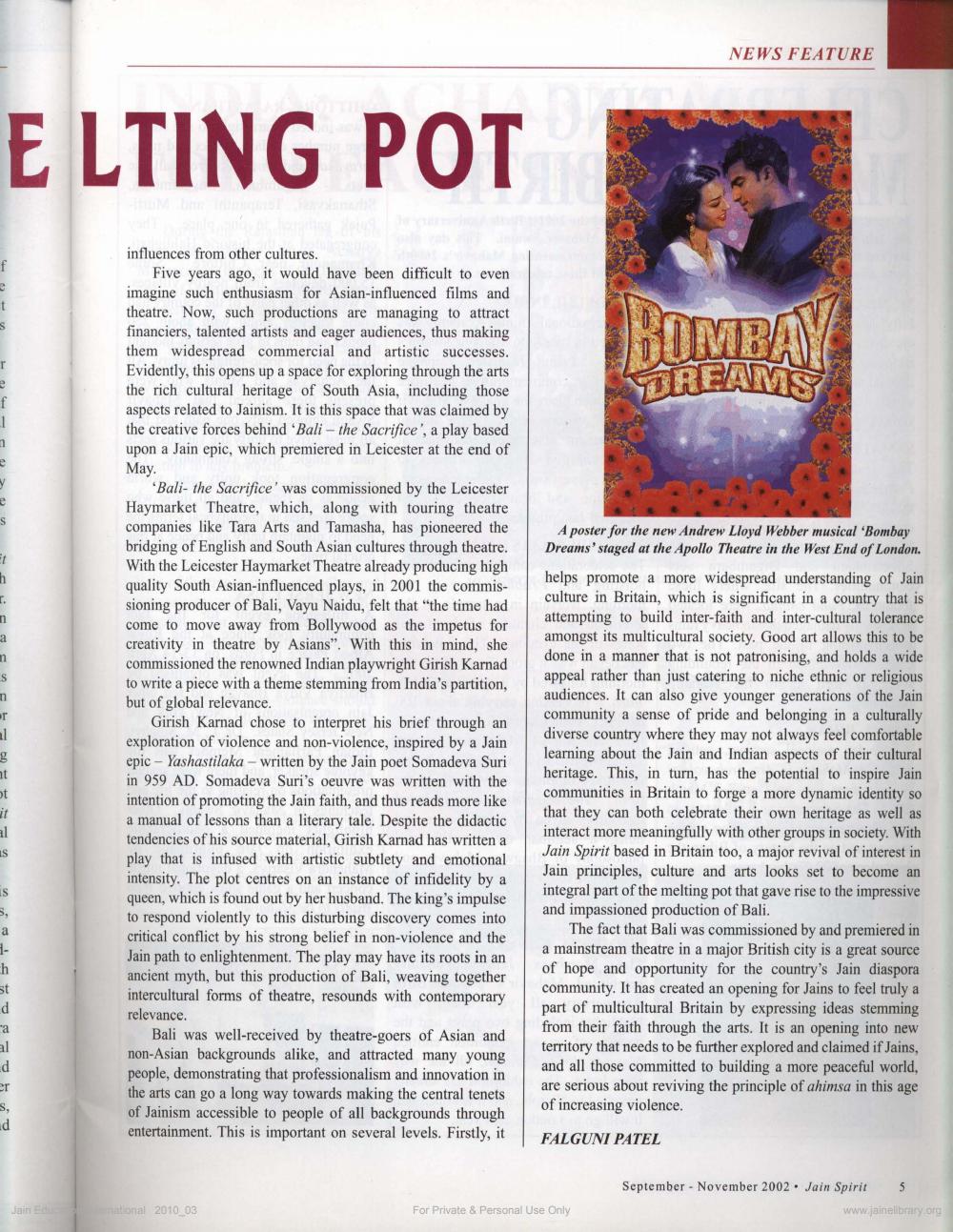Book Title: Jain Spirit 2002 10 No 12 Author(s): Jain Spirit UK Publisher: UK Young Jains View full book textPage 7
________________ ELTING POT f t f 1 1 S h I. n a n S n al g at ot it al IS is a 1 h st d a al d er S, d Jain Edu ST influences from other cultures. Five years ago, it would have been difficult to even imagine such enthusiasm for Asian-influenced films and theatre. Now, such productions are managing to attract financiers, talented artists and eager audiences, thus making them widespread commercial and artistic successes. Evidently, this opens up a space for exploring through the arts the rich cultural heritage of South Asia, including those aspects related to Jainism. It is this space that was claimed by the creative forces behind 'Bali - the Sacrifice', a play based upon a Jain epic, which premiered in Leicester at the end of May. 'Bali- the Sacrifice' was commissioned by the Leicester Haymarket Theatre, which, along with touring theatre companies like Tara Arts and Tamasha, has pioneered the bridging of English and South Asian cultures through theatre. With the Leicester Haymarket Theatre already producing high quality South Asian-influenced plays, in 2001 the commissioning producer of Bali, Vayu Naidu, felt that "the time had come to move away from Bollywood as the impetus for creativity in theatre by Asians". With this in mind, she commissioned the renowned Indian playwright Girish Karnad to write a piece with a theme stemming from India's partition, but of global relevance. Girish Karnad chose to interpret his brief through an exploration of violence and non-violence, inspired by a Jain epic - Yashastilaka - written by the Jain poet Somadeva Suri in 959 AD. Somadeva Suri's oeuvre was written with the intention of promoting the Jain faith, and thus reads more like a manual of lessons than a literary tale. Despite the didactic tendencies of his source material, Girish Karnad has written a play that is infused with artistic subtlety and emotional intensity. The plot centres on an instance of infidelity by a queen, which is found out by her husband. The king's impulse to respond violently to this disturbing discovery comes into critical conflict by his strong belief in non-violence and the Jain path to enlightenment. The play may have its roots in an ancient myth, but this production of Bali, weaving together intercultural forms of theatre, resounds with contemporary relevance. Bali was well-received by theatre-goers of Asian and non-Asian backgrounds alike, and attracted many young people, demonstrating that professionalism and innovation in the arts can go a long way towards making the central tenets of Jainism accessible to people of all backgrounds through entertainment. This is important on several levels. Firstly, it national 2010_03 NEWS FEATURE BOMBAY DREAMS A poster for the new Andrew Lloyd Webber musical 'Bombay Dreams' staged at the Apollo Theatre in the West End of London. helps promote a more widespread understanding of Jain culture in Britain, which is significant in a country that is attempting to build inter-faith and inter-cultural tolerance amongst its multicultural society. Good art allows this to be done in a manner that is not patronising, and holds a wide appeal rather than just catering to niche ethnic or religious audiences. It can also give younger generations of the Jain community a sense of pride and belonging in a culturally diverse country where they may not always feel comfortable learning about the Jain and Indian aspects of their cultural heritage. This, in turn, has the potential to inspire Jain communities in Britain to forge a more dynamic identity so that they can both celebrate their own heritage as well as interact more meaningfully with other groups in society. With Jain Spirit based in Britain too, a major revival of interest in Jain principles, culture and arts looks set to become an integral part of the melting pot that gave rise to the impressive and impassioned production of Bali. For Private & Personal Use Only The fact that Bali was commissioned by and premiered in a mainstream theatre in a major British city is a great source of hope and opportunity for the country's Jain diaspora community. It has created an opening for Jains to feel truly a part of multicultural Britain by expressing ideas stemming from their faith through the arts. It is an opening into new territory that needs to be further explored and claimed if Jains, and all those committed to building a more peaceful world, are serious about reviving the principle of ahimsa in this age of increasing violence. FALGUNI PATEL September November 2002 Jain Spirit 5 www.jainelibrary.orgPage Navigation
1 ... 5 6 7 8 9 10 11 12 13 14 15 16 17 18 19 20 21 22 23 24 25 26 27 28 29 30 31 32 33 34 35 36 37 38 39 40 41 42 43 44 45 46 47 48 49 50 51 52 53 54 55 56 57 58 59 60 61 62 63 64 65 66 67 68
